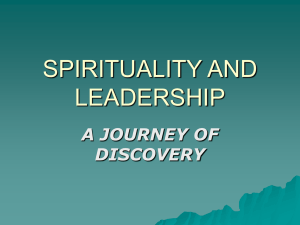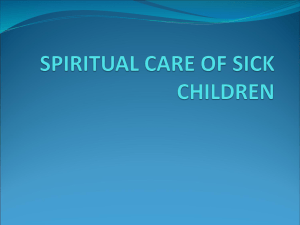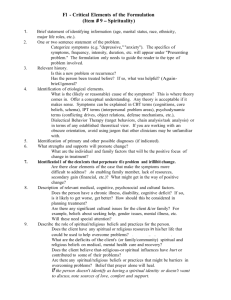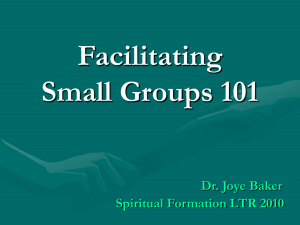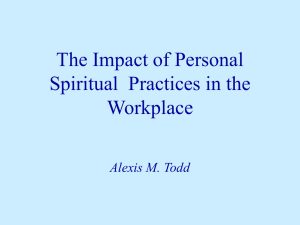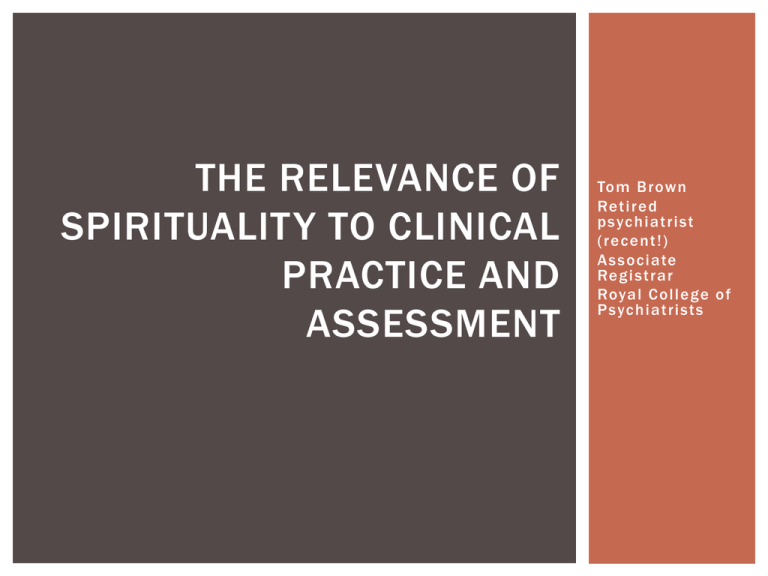
THE RELEVANCE OF
SPIRITUALITY TO CLINICAL
PRACTICE AND
ASSESSMENT
To m B row n
Ret i re d
ps yc h iat rist
( re c e nt ! )
As s ociate
Re g i st rar
Roya l Co lle ge o f
P s yc h iat rists
HISTORY OF PSYCHIATRY AND RELIGION
Lots of antipathy to religion:
Freud-longing for a father at the root of man’s need for
religion-”The Future of an Illusion” 1927
Maudsley -OT prophets showed “striking features of madness”
Mohammed “visions were of that kind which medical
experience shows to
be typical of epilepsy”
MAUDSLEY ON CHRISTIANS
“Their follies have been
the symptoms of an insane selfhood
which identified itself with religion….
apeing humility with religious pride
and making it more odious ”
THE BIOPSYCHOSOCIAL MODEL
Pride ourselves on “holistic “ approach
Biological
Psychological
Social
……but rarely spiritual. Many if not most, more comfortable
taking a detailed sexual Hx
Maybe we need a “spiritual awareness” aspect to training cf:
the “Sex week” !
ARE WE REALLY HOLISTIC?
Biological/psychological feuds throughout my career (to the
detriment of ourselves and our patients)
Feuds about which psychological model should dominate
Often pay lip service to holism
Leon Eisenberg
Alison Snyder
Child psychiatrist who pioneered early
studies of autism. Born Aug 8, 1922, in
Philadelphia, PA, USA, he died of prostate
cancer on Sept 15, 2009, in Cambridge, MA,
USA, aged 87 years.
“Psychiatry is all biological and all social.
There is no mental function without brain
and social context. To ask how much of mind
is biological and how much social is as
meaningless as to ask how much of the area
of a rectangle is due to its width and how
much to its height”, wrote Leon Eisenberg in
1995.
The power of medical interventions, for
good and for harm, will increase
enormously. However, in the next
millennium, as in this one, social factors will
continue to be decisive for health status. The
distribution of health and disease in human
populations reflects where people live, what
they eat, the work they do, the air and the
water they consume, their activity, their
interconnectedness with others, and the
status they occupy in the social order.
WHAT IS SPIRITUALIT Y?
Lots of definitions!
“..a way of being and experiencing that comes through
awareness of a transcendental dimension and is characterised
by certain identifiable variables in regard to self, others, nature,
life and whatever one considers to be ultimate” Elkins et al
1988
“…concerned with meaning and purpose in life, truth and values”
Cook 2004
IT’S NOT THE SAME AS RELIGION
(IT’S MUCH BROADER)
BUT IT DOES INCLUDE AND EMBRACE RELIGIOUS
BELIEFS AND VALUES
RELIGION AND MENTAL HEALTH
KOE N I G H G E T A L( 2 0 01 ) H A N DBOOK OF RE LI G I ON A N D
H E A LT H , OUP
Positive ef fects:
Self rated happiness and life satisfaction
Hope and optimism
Meaning and purpose in life
Adapting to loss/bereavement
Greater social support
Lower rates of suicide/depression
Lower rates of substance misuse
Less delinquency
Better marital adjustment
RELIGION AND MENTAL HEALTH
Negative ef fects:
Stress caused by excessive devotion to religious activities (and
its impact on other activities eg work/home life)
Rigid legalistic thinking/judgemental
attitudes/guilt/concealing certain kinds of thoughts /feelings
Failure to seek medical help
Stigmatising others-defining them as “other” or “dif ferent”
RELIGION AND MENTAL HEALTH
A word of caution
Considerable variation in attitude and practice even
within the major religions eg Islam, Christianity, not to
mention spiritual belief and practice out with this.
ie even if you think you “know” about someone’s
spirituality because its similar/the same as yours
make no assumptions
Allport’s work on intrinsic and extrinsic religiosity of
relevance here - the benefits of religion may be
confined to the former !
SPIRITUALIT Y OF MENTAL HEALTH
PROFESSIONALS
Pretty strong consensus (from research) that we are
less religious than our patients
Little research on importance of religious or spiritual
variables (especially in medical/psychiatric journals)
nurses, social workers a bit better!
See work of Michael King and Andrew Sims
ISSUES FOR PSYCHIATRISTS
70% don’t believe in God (evidence based)
….and I doubt if most of the rest would describe
themselves as in touch with their spiritual side (non
evidence based!!)
Trained in a pretty materialistic, evidence based
setting –some would say reductionist cf Malcolm
Jeeves “nothing buttery ”
ISSUES FOR PSYCHIATRISTS
Evidence based on that which you can experience through
your senses and through science (empiricism) which is good
and proper in some contexts, but fails to acknowledge other
routes to wisdom and knowledge
Historical antipathy to religion from some of our founding
fathers ( eg Freud, Maudsley, Griesinger -see earlier)
WHY DON’T WE BROACH THIS TOPIC WITH
THOSE WE SEE IN A CLINICAL CONTEXT?
SW I NTON 2 0 01 ( QUOTI NG TAY LOR E T A L 1 9 9 5 )
Spirituality = religion
We feel unskilled
Our own spiritual ambiguity/uncertainty
Lack of time/resource
Fear of imposing our own beliefs (boundary
violations)
Fear of intruding
Psychologising (the “ nothing but” problem)
Prejudice “ it isn’t important”
WHY SHOULD WE ASSESS SPIRITUALIT Y?
KOENIG ET AL(2005)
10 reasons:
1.It promotes a positive world view
2.Helps us make sense of dif ficult situations
3.Meaning and purpose
4.Discourage maladaptive coping
5.Enhance social support
6.Promote “other directedness”
7.Promotes need for control
8.Provide and encourage forgiveness
9.Encourage thankfulness
10.Provide hope
ASSESSING SPIRITUALIT Y
Quantitative methods:
Royal Free Interview for Religious and Spiritual
Beliefs(King et al 1995)
Spiritual Involvement and Beliefs Scale (Hatch et al
1998)
Clinical interview
WHAT TO ASK PATIENTS?
(CULLIFORD AND EAGER 2009)
Screening questions
“would you describe yourself as religious or spiritual”
“when things are dif ficult or stressful what helps you most”
Importance of third party history
Reflective and clarifying interview style to ensure you
understand.
SPIRITUAL BEHAVIOURS-RELIGIOUS
Attend worship
Prayer/meditation
Rituals
Use of music eg hymns, chants
Pilgrimage/retreats
Reading sacred texts
SPIRITUAL BEHAVIOURS-SECULAR
Contemplation
Altruistic acts
Yoga/Tai Chi
Engagement with nature
Contemplative reading
Artistic /creative
USEFUL APPROACHES-HOPE
ANDARAJAH AND HIGHT(2001)
sources of Hope, meaning, love comfort
Organised religion
Personal spirituality and practices
Effects on medical and psychiatric care
USEFUL APPROACHES-SPIRIT
(MAUGANS 1996)
Spiritual belief system
Personal spirituality
Involvement in religious/spiritual communities
Ritualised practices and Restrictions
Implications for medical care
Terminal events planning
GUIDANCE ON ASSESSMENT MODELS
1.
John Swinton “ Spirituality and Mental Health Care” 2001 ,
Jessica Kingsley Publishers
2.
Larry Culliford and Sarah Eagger “ Assessing Spiritual
Needs” in Spirituality and Psychiatry eds, Cook, Powell and
Sims 2009,RCPsych Publications
WHO SHOULD DO IT?
Chaplains - can’t possibly assess everyone and not everyone
would agree to see them!
Nurses - government reviews of nursing both north and south
of the border have told nurses they need to be mindful of this
area
Doctors - ?
Most resistant group
WHEN SHOULD IT BE DONE
Clinical judgement required here - very rarely should more
than screening questions be asked at initial assessment
Works better when therapeutic relationship has developed
Of fers of involvement of chaplaincy/spiritual care services
should be made
SUMMARY
We are less religious/spiritual than our patients
Holistic approaches should include spirituality
Awareness of how our own beliefs af fect our approach to this is of
paramount impor tance
Don’t assume you understand because your own religious /spiritual
af filiations are similar to the patients
Familiarise your self with a simple assessment approach
Education about religious/spiritual beliefs other than your own
“TO ASSESS PEOPLE’S SPIRITUALIT Y…..
WILL ENABLE PRACTITIONERS TO
REKINDLE MY THOS AND PUT THE PSYCHE
BACK INTO PSYCHIATRY.
THE PSYCHE BEING OF COURSE, OUR SOUL”
LARRY CULLIFORD




